培根 论爱情 中英对照
- 格式:doc
- 大小:30.00 KB
- 文档页数:3
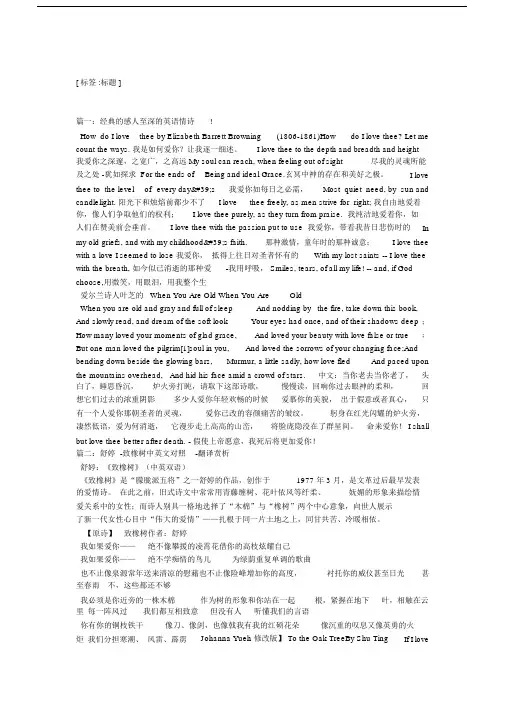
[ 标签 :标题 ]篇一:经典的感人至深的英语情诗!How do I love thee by Elizabeth Barrett Browning(1806-1861)How do I love thee? Let me count the ways. 我是如何爱你?让我逐一细述。
I love thee to the depth and breadth and height我爱你之深邃,之宽广,之高远My soul can reach, when feeling out of sight尽我的灵魂所能及之处 -犹如探求 For the ends of Being and ideal Grace.玄冥中神的存在和美好之极。
I love thee to the level of every day's我爱你如每日之必需,Most quiet need, by sun and candlelight. 阳光下和烛焰前都少不了I love thee freely, as men strive for right; 我自由地爱着你,像人们争取他们的权利;I love thee purely, as they turn from praise. 我纯洁地爱着你,如人们在赞美前会垂首。
I love thee with the passion put to use 我爱你,带着我昔日悲伤时的In my old griefs, and with my childhood's faith.那种激情,童年时的那种诚意;I love thee with a love I seemed to lose 我爱你,抵得上往日对圣者怀有的With my lost saints -- I love thee with the breath, 如今似已消逝的那种爱-我用呼吸, Smiles, tears, of all my life! -- and, if God choose,用微笑,用眼泪,用我整个生爱尔兰诗人叶芝的 When You Are Old When You Are OldWhen you are old and gray and full of sleep And nodding by the fire, take down this book, And slowly read, and dream of the soft look Your eyes had once, and of their shadows deep;How many loved your moments of glad grace,And loved your beauty with love false or true;But one man loved the pilgrim[1]soul in you,And loved the sorrows of your changing face;And bending down beside the glowing bars,Murmur, a little sadly, how love fled And paced upon the mountains overhead, And hid his face amid a crowd of stars.中文:当你老去当你老了,头白了,睡思昏沉,炉火旁打盹,请取下这部诗歌,慢慢读,回响你过去眼神的柔和,回想它们过去的浓重阴影多少人爱你年轻欢畅的时候爱慕你的美貌,出于假意或者真心,只有一个人爱你那朝圣者的灵魂,爱你已改的容颜痛苦的皱纹。
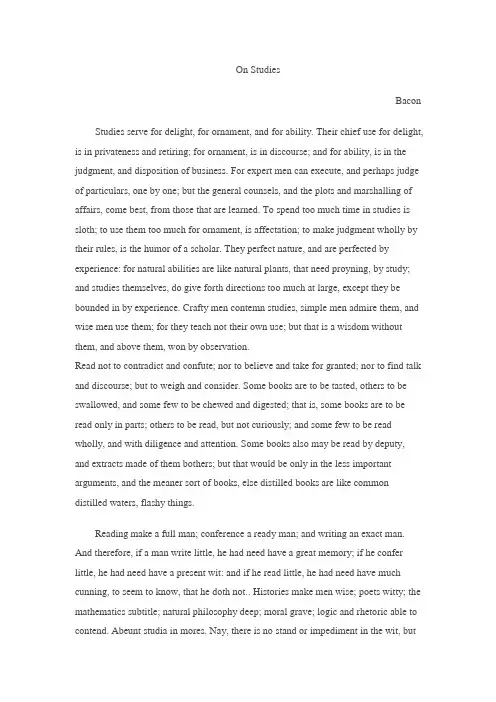
On StudiesBaconStudies serve for delight, for ornament, and for ability. Their chief use for delight, is in privateness and retiring; for ornament, is in discourse; and for ability, is in the judgment, and disposition of business. For expert men can execute, and perhaps judge of particulars, one by one; but the general counsels, and the plots and marshalling of affairs, come best, from those that are learned. To spend too much time in studies is sloth; to use them too much for ornament, is affectation; to make judgment wholly by their rules, is the humor of a scholar. They perfect nature, and are perfected by experience: for natural abilities are like natural plants, that need proyning, by study; and studies themselves, do give forth directions too much at large, except they be bounded in by experience. Crafty men contemn studies, simple men admire them, and wise men use them; for they teach not their own use; but that is a wisdom without them, and above them, won by observation.Read not to contradict and confute; nor to believe and take for granted; nor to find talk and discourse; but to weigh and consider. Some books are to be tasted, others to be swallowed, and some few to be chewed and digested; that is, some books are to be read only in parts; others to be read, but not curiously; and some few to be read wholly, and with diligence and attention. Some books also may be read by deputy, and extracts made of them bothers; but that would be only in the less important arguments, and the meaner sort of books, else distilled books are like common distilled waters, flashy things.Reading make a full man; conference a ready man; and writing an exact man. And therefore, if a man write little, he had need have a great memory; if he confer little, he had need have a present wit: and if he read little, he had need have much cunning, to seem to know, that he doth not.. Histories make men wise; poets witty; the mathematics subtitle; natural philosophy deep; moral grave; logic and rhetoric able to contend. Abeunt studia in mores. Nay, there is no stand or impediment in the wit, butmay be wrought out by fit studies; like as diseases of the body, may have appropriate exercises. Bowling is good for the stone and reins; shooting for the lungs and breast; gentle walking for the stomach; riding for the head; and the like.So if a man\'s wit be wandering, let him study the mathematics; for in demonstrations, if his wit be called away never so little, he must begin again. If his wit be not apt to distinguish or find differences, let him study the Schoolmen; for they are cymini sectors. If he be not apt to beat over matters, and to call up one thing to prove and illustrate another, let him study the lawyers\' cases. So every defect of the mind, may have a special receipt.求知可以作为消遣,可以作为装饰,也可以增长才干。
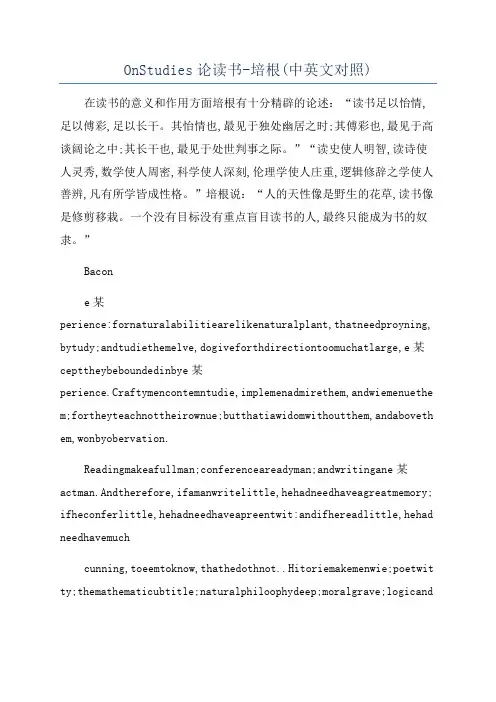
OnStudies论读书-培根(中英文对照)在读书的意义和作用方面培根有十分精辟的论述:“读书足以怡情,足以傅彩,足以长干。
其怡情也,最见于独处幽居之时;其傅彩也,最见于高谈阔论之中;其长干也,最见于处世判事之际。
”“读史使人明智,读诗使人灵秀,数学使人周密,科学使人深刻,伦理学使人庄重,逻辑修辞之学使人善辨,凡有所学皆成性格。
”培根说:“人的天性像是野生的花草,读书像是修剪移栽。
一个没有目标没有重点盲目读书的人,最终只能成为书的奴隶。
”Bacone某perience:fornaturalabilitiearelikenaturalplant,thatneedproyning, bytudy;andtudiethemelve,dogiveforthdirectiontoomuchatlarge,e某cepttheybeboundedinbye某perience.Craftymencontemntudie,implemenadmirethem,andwiemenuethe m;fortheyteachnottheirownue;butthatiawidomwithoutthem,andaboveth em,wonbyobervation.Readingmakeafullman;conferenceareadyman;andwritingane某actman.Andtherefore,ifamanwritelittle,hehadneedhaveagreatmemory; ifheconferlittle,hehadneedhaveapreentwit:andifhereadlittle,hehad needhavemuchcunning,toeemtoknow,thathedothnot..Hitoriemakemenwie;poetwit ty;themathematicubtitle;naturalphiloophydeep;moralgrave;logicandrhetoricabletocontend.Abeunttudiainmore.Nay,thereinotandorimpedi mentinthewit,but在读书的意义和作用方面培根有十分精辟的论述:“读书足以怡情,足以傅彩,足以长干。
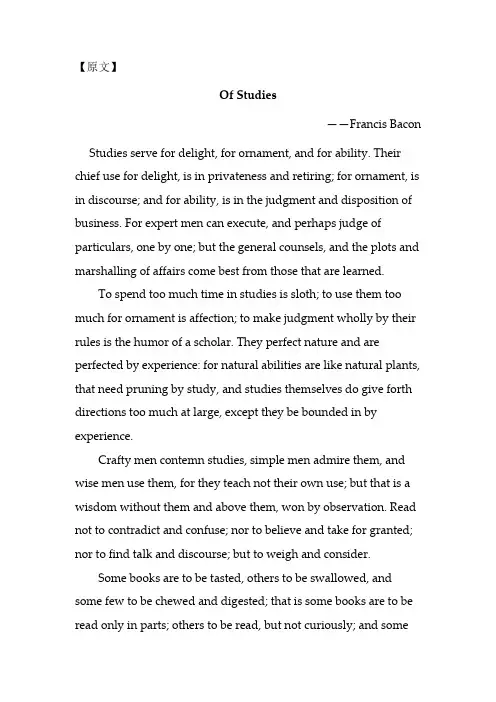
【原文】Of Studies——Francis Bacon Studies serve for delight, for ornament, and for ability. Their chief use for delight, is in privateness and retiring; for ornament, is in discourse; and for ability, is in the judgment and disposition of business. For expert men can execute, and perhaps judge of particulars, one by one; but the general counsels, and the plots and marshalling of affairs come best from those that are learned.To spend too much time in studies is sloth; to use them too much for ornament is affection; to make judgment wholly by their rules is the humor of a scholar. They perfect nature and are perfected by experience: for natural abilities are like natural plants, that need pruning by study, and studies themselves do give forth directions too much at large, except they be bounded in by experience.Crafty men contemn studies, simple men admire them, and wise men use them, for they teach not their own use; but that is a wisdom without them and above them, won by observation. Read not to contradict and confuse; nor to believe and take for granted; nor to find talk and discourse; but to weigh and consider.Some books are to be tasted, others to be swallowed, and some few to be chewed and digested; that is some books are to be read only in parts; others to be read, but not curiously; and somefew to be ready wholly, and with diligence and attention. Some books also may be read by deputy and extracts made of them by others; but that would be only in the less important arguments, and the meaner sort of books; else distilled books are, like common distilled waters, flashy things.Reading makes a full man; conference a ready man; and writing an exact man. And therefore, if a man write little, he had need have a great memory; if he confer little, he had need have a present wit; and if he read little, he had need have much cunning to seem to know that he doth not.Histories make men wise; poets witty; the mathematics subtle; natural philosophy deep; moral grave; logic and rhetoric able to contend.Abeunt studia in mores. Nay there is no stond or impediment in the wit, but may be wrought out by fit studies: like as diseases of the body may have appropriate exercises. Bowling is good for the stone and reins; shooting for the lungs and breast; gentle walking for the stomach; riding for the head; and the like. So if a man’s wit be wandering, let him study the mathematics; for in demonstrations, if his wit be called away never so little, he must begin again. If his wit be not apt to distinguish or find differences, let him study the schoolmen; for they are cymini sectores. If he be not apt to beat over matters, and to call up one thing to prove andillustrate another, let him study the lawyers’ cases. So every defect of the mind may have a special receipt.谈读书——王佐良译读书足以怡情,足以博彩,足以长才。
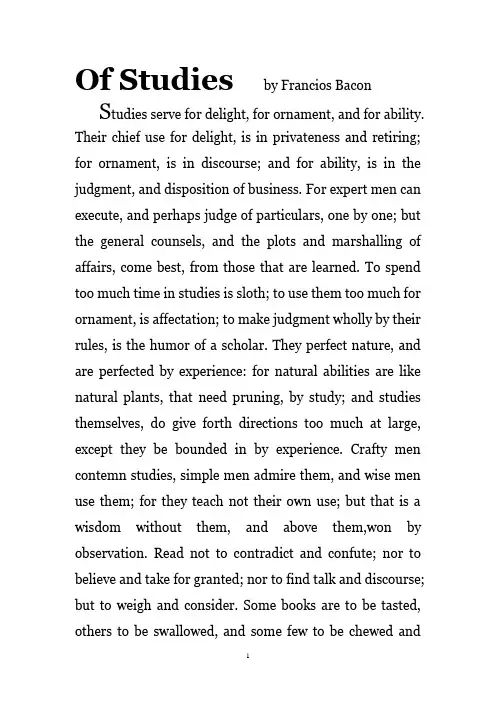
Of Studies by Francios BaconS tudies serve for delight, for ornament, and for ability. Their chief use for delight, is in privateness and retiring; for ornament, is in discourse; and for ability, is in the judgment, and disposition of business. For expert men can execute, and perhaps judge of particulars, one by one; but the general counsels, and the plots and marshalling of affairs, come best, from those that are learned. To spend too much time in studies is sloth; to use them too much for ornament, is affectation; to make judgment wholly by their rules, is the humor of a scholar. They perfect nature, and are perfected by experience: for natural abilities are like natural plants, that need pruning, by study; and studies themselves, do give forth directions too much at large, except they be bounded in by experience. Crafty men contemn studies, simple men admire them, and wise men use them; for they teach not their own use; but that is a wisdom without them, and above them,won by observation. Read not to contradict and confute; nor to believe and take for granted; nor to find talk and discourse; but to weigh and consider. Some books are to be tasted, others to be swallowed, and some few to be chewed anddigested; that is, some books are to be read only in parts; others to be read, but not curiously; and some few to be read wholly, and with diligence and attention. Some books also may be read by deputy, and extracts made of them by others; but that would be only in the less important arguments, and the meaner sort of books, else distilled books are like common distilled waters, flashy things.Reading make a full man; conference a ready man; and writing an exact man. And therefore, if a man write little, he had need have a great memory; if he confer little, he had need have a present wit; and if he read little, he had need have much cunning, to seem to know, that he does not. Histories make men wise; poets witty; the mathematics subtitle; natural philosophy deep; moral grave; logic and rhetoric able to contend.谈读书读书足以怡情,足以博彩,足以长才。
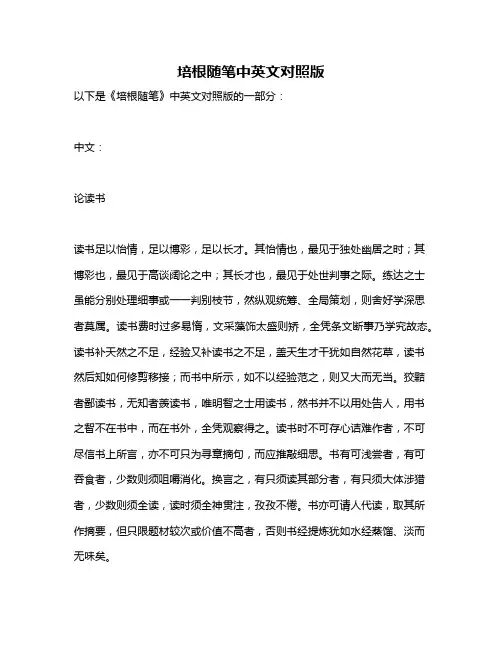
培根随笔中英文对照版以下是《培根随笔》中英文对照版的一部分:中文:论读书读书足以怡情,足以博彩,足以长才。
其怡情也,最见于独处幽居之时;其博彩也,最见于高谈阔论之中;其长才也,最见于处世判事之际。
练达之士虽能分别处理细事或一一判别枝节,然纵观统筹、全局策划,则舍好学深思者莫属。
读书费时过多易惰,文采藻饰太盛则矫,全凭条文断事乃学究故态。
读书补天然之不足,经验又补读书之不足,盖天生才干犹如自然花草,读书然后知如何修剪移接;而书中所示,如不以经验范之,则又大而无当。
狡黠者鄙读书,无知者羡读书,唯明智之士用读书,然书并不以用处告人,用书之智不在书中,而在书外,全凭观察得之。
读书时不可存心诘难作者,不可尽信书上所言,亦不可只为寻章摘句,而应推敲细思。
书有可浅尝者,有可吞食者,少数则须咀嚼消化。
换言之,有只须读其部分者,有只须大体涉猎者,少数则须全读,读时须全神贯注,孜孜不倦。
书亦可请人代读,取其所作摘要,但只限题材较次或价值不高者,否则书经提炼犹如水经蒸馏、淡而无味矣。
英文:Of StudiesStudies serve for delight, for ornament, and for ability. Their chief use for delight, is in privateness and retiring; for ornament, is in discourse; and for ability, is in the judgment and disposition of business. For expert men can execute, and perhaps judge of particulars, one by one; but the general counsels, and the plots and marshalling of affairs, come best from those that are learned. To spend too much time in studies is sloth; to use them too much for ornament, is affectation; to make judgment wholly by their rules, is the humor of a scholar. They perfect nature, and are perfected by experience: for natural abilities are like natural plants, that need pruning, by study; and studies themselves, do give forth directions too much at large, except they be bounded in by experience. Crafty men contemn studies, simple men admire them, and wise men use them; for they teach not their own use; but that is a wisdom without them, and above them, won by observation. Read not to contradict and confute; nor to believe and take for granted; nor to find talk and discourse;but to weigh and consider. Some books are to be tasted, others tobe swallowed, and some few to be chewed and digested; that is, some books are to be read only in parts; others to be read, but not curiously; and some few to be read wholly, and with diligence and attention. Books beyond doubt are the best of things; yet when they are not ill used they may become the worst; for they may free usfrom employment; give a man idle and solitary thoughts; or introduce sects and divisions, among the scholars themselves. Histories make men wise; poets witty; the mathematics subtle; natural philosophy deep; moral philosophy thorough; logic and rhetoric able to contend. A man that reads few books is apt to be illiterate; and many things he hath need know, do lack him. But if a man read too many, he may become infected with some vice of the mind; or if he use them ill, grow too much to form the tongue.注意:由于篇幅限制,这里只提供了一小部分《培根随笔》的中英文对照版。
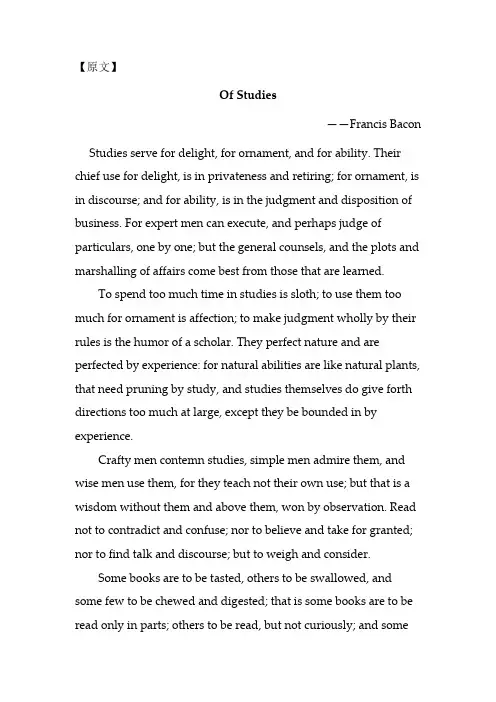
【原文】Of Studies——Francis Bacon Studies serve for delight, for ornament, and for ability. Their chief use for delight, is in privateness and retiring; for ornament, is in discourse; and for ability, is in the judgment and disposition of business. For expert men can execute, and perhaps judge of particulars, one by one; but the general counsels, and the plots and marshalling of affairs come best from those that are learned.To spend too much time in studies is sloth; to use them too much for ornament is affection; to make judgment wholly by their rules is the humor of a scholar. They perfect nature and are perfected by experience: for natural abilities are like natural plants, that need pruning by study, and studies themselves do give forth directions too much at large, except they be bounded in by experience.Crafty men contemn studies, simple men admire them, and wise men use them, for they teach not their own use; but that is a wisdom without them and above them, won by observation. Read not to contradict and confuse; nor to believe and take for granted; nor to find talk and discourse; but to weigh and consider.Some books are to be tasted, others to be swallowed, and some few to be chewed and digested; that is some books are to be read only in parts; others to be read, but not curiously; and somefew to be ready wholly, and with diligence and attention. Some books also may be read by deputy and extracts made of them by others; but that would be only in the less important arguments, and the meaner sort of books; else distilled books are, like common distilled waters, flashy things.Reading makes a full man; conference a ready man; and writing an exact man. And therefore, if a man write little, he had need have a great memory; if he confer little, he had need have a present wit; and if he read little, he had need have much cunning to seem to know that he doth not.Histories make men wise; poets witty; the mathematics subtle; natural philosophy deep; moral grave; logic and rhetoric able to contend.Abeunt studia in mores. Nay there is no stond or impediment in the wit, but may be wrought out by fit studies: like as diseases of the body may have appropriate exercises. Bowling is good for the stone and reins; shooting for the lungs and breast; gentle walking for the stomach; riding for the head; and the like. So if a man’s wit be wandering, let him study the mathematics; for in demonstrations, if his wit be called away never so little, he must begin again. If his wit be not apt to distinguish or find differences, let him study the schoolmen; for they are cymini sectores. If he be not apt to beat over matters, and to call up one thing to prove andillustrate another, let him study the lawyers’ cases. So every defect of the mind may have a special receipt.谈读书——王佐良译读书足以怡情,足以博彩,足以长才。
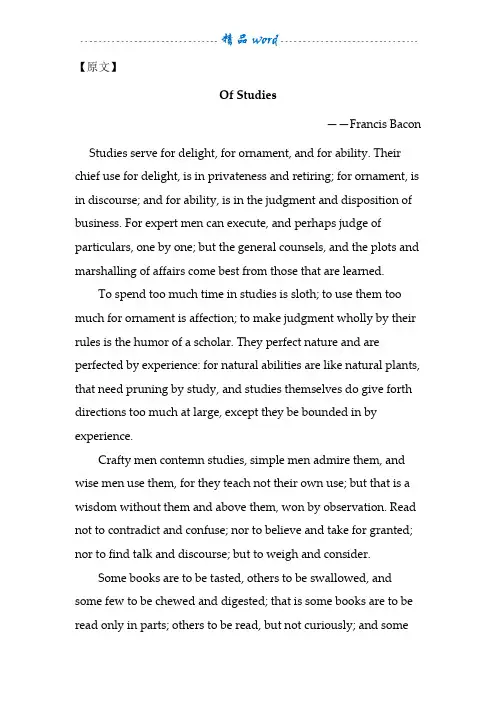
【原文】Of Studies——Francis Bacon Studies serve for delight, for ornament, and for ability. Their chief use for delight, is in privateness and retiring; for ornament, is in discourse; and for ability, is in the judgment and disposition of business. For expert men can execute, and perhaps judge of particulars, one by one; but the general counsels, and the plots and marshalling of affairs come best from those that are learned.To spend too much time in studies is sloth; to use them too much for ornament is affection; to make judgment wholly by their rules is the humor of a scholar. They perfect nature and are perfected by experience: for natural abilities are like natural plants, that need pruning by study, and studies themselves do give forth directions too much at large, except they be bounded in by experience.Crafty men contemn studies, simple men admire them, and wise men use them, for they teach not their own use; but that is a wisdom without them and above them, won by observation. Read not to contradict and confuse; nor to believe and take for granted; nor to find talk and discourse; but to weigh and consider.Some books are to be tasted, others to be swallowed, and some few to be chewed and digested; that is some books are to be read only in parts; others to be read, but not curiously; and somefew to be ready wholly, and with diligence and attention. Some books also may be read by deputy and extracts made of them by others; but that would be only in the less important arguments, and the meaner sort of books; else distilled books are, like common distilled waters, flashy things.Reading makes a full man; conference a ready man; and writing an exact man. And therefore, if a man write little, he had need have a great memory; if he confer little, he had need have a present wit; and if he read little, he had need have much cunning to seem to know that he doth not.Histories make men wise; poets witty; the mathematics subtle; natural philosophy deep; moral grave; logic and rhetoric able to contend.Abeunt studia in mores. Nay there is no stond or impediment in the wit, but may be wrought out by fit studies: like as diseases of the body may have appropriate exercises. Bowling is good for the stone and reins; shooting for the lungs and breast; gentle walking for the stomach; riding for the head; and the like. So if a man’s wit be wandering, let him study the mathematics; for in demonstrations, if his wit be called away never so little, he must begin again. If his wit be not apt to distinguish or find differences, let him study the schoolmen; for they are cymini sectores. If he be not apt to beat over matters, and to call up one thing to prove andillustrate another, let him study the l awyers’ cases. So every defect of the mind may have a special receipt.谈读书——王佐良译读书足以怡情,足以博彩,足以长才。
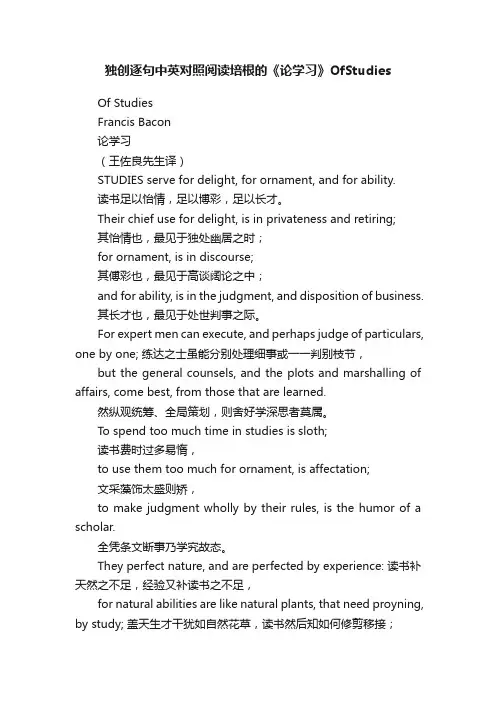
独创逐句中英对照阅读培根的《论学习》OfStudiesOf StudiesFrancis Bacon论学习(王佐良先生译)STUDIES serve for delight, for ornament, and for ability.读书足以怡情,足以博彩,足以长才。
Their chief use for delight, is in privateness and retiring;其怡情也,最见于独处幽居之时;for ornament, is in discourse;其傅彩也,最见于高谈阔论之中;and for ability, is in the judgment, and disposition of business.其长才也,最见于处世判事之际。
For expert men can execute, and perhaps judge of particulars, one by one; 练达之士虽能分别处理细事或一一判别枝节,but the general counsels, and the plots and marshalling of affairs, come best, from those that are learned.然纵观统筹、全局策划,则舍好学深思者莫属。
To spend too much time in studies is sloth;读书费时过多易惰,to use them too much for ornament, is affectation;文采藻饰太盛则矫,to make judgment wholly by their rules, is the humor of a scholar.全凭条文断事乃学究故态。
They perfect nature, and are perfected by experience: 读书补天然之不足,经验又补读书之不足,for natural abilities are like natural plants, that need proyning, by study; 盖天生才干犹如自然花草,读书然后知如何修剪移接;and studies themselves, do give forth directions too much at large, except they be bounded in by experience.而书中所示,如不以经验范之,则又大而无当。
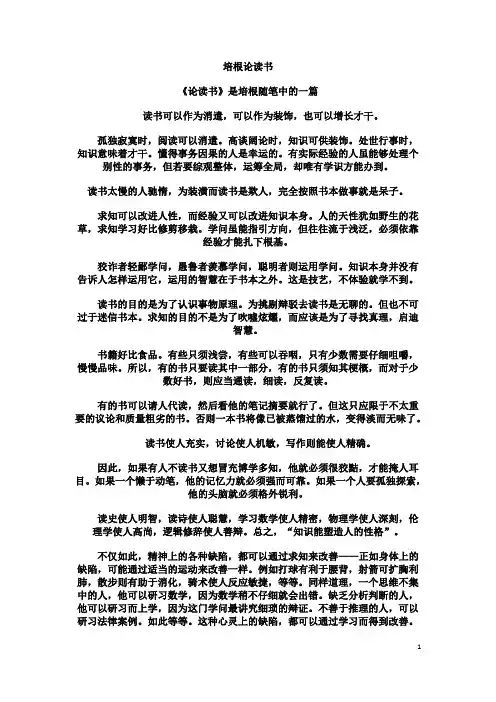
培根论读书《论读书》是培根随笔中的一篇读书可以作为消遣,可以作为装饰,也可以增长才干。
孤独寂寞时,阅读可以消遣。
高谈阔论时,知识可供装饰。
处世行事时,知识意味着才干。
懂得事务因果的人是幸运的。
有实际经验的人虽能够处理个别性的事务,但若要综观整体,运筹全局,却唯有学识方能办到。
读书太慢的人驰惰,为装潢而读书是欺人,完全按照书本做事就是呆子。
求知可以改进人性,而经验又可以改进知识本身。
人的天性犹如野生的花草,求知学习好比修剪移栽。
学问虽能指引方向,但往往流于浅泛,必须依靠经验才能扎下根基。
狡诈者轻鄙学问,愚鲁者羡慕学问,聪明者则运用学问。
知识本身并没有告诉人怎样运用它,运用的智慧在于书本之外。
这是技艺,不体验就学不到。
读书的目的是为了认识事物原理。
为挑剔辩驳去读书是无聊的。
但也不可过于迷信书本。
求知的目的不是为了吹嘘炫耀,而应该是为了寻找真理,启迪智慧。
书籍好比食品。
有些只须浅尝,有些可以吞咽,只有少数需要仔细咀嚼,慢慢品味。
所以,有的书只要读其中一部分,有的书只须知其梗概,而对于少数好书,则应当通读,细读,反复读。
有的书可以请人代读,然后看他的笔记摘要就行了。
但这只应限于不太重要的议论和质量粗劣的书。
否则一本书将像已被蒸馏过的水,变得淡而无味了。
读书使人充实,讨论使人机敏,写作则能使人精确。
因此,如果有人不读书又想冒充博学多知,他就必须很狡黠,才能掩人耳目。
如果一个懒于动笔,他的记忆力就必须强而可靠。
如果一个人要孤独探索,他的头脑就必须格外锐利。
读史使人明智,读诗使人聪慧,学习数学使人精密,物理学使人深刻,伦理学使人高尚,逻辑修辞使人善辩。
总之,“知识能塑造人的性格”。
不仅如此,精神上的各种缺陷,都可以通过求知来改善——正如身体上的缺陷,可能通过适当的运动来改善一样。
例如打球有利于腰背,射箭可扩胸利肺,散步则有助于消化,骑术使人反应敏捷,等等。
同样道理,一个思维不集中的人,他可以研习数学,因为数学稍不仔细就会出错。
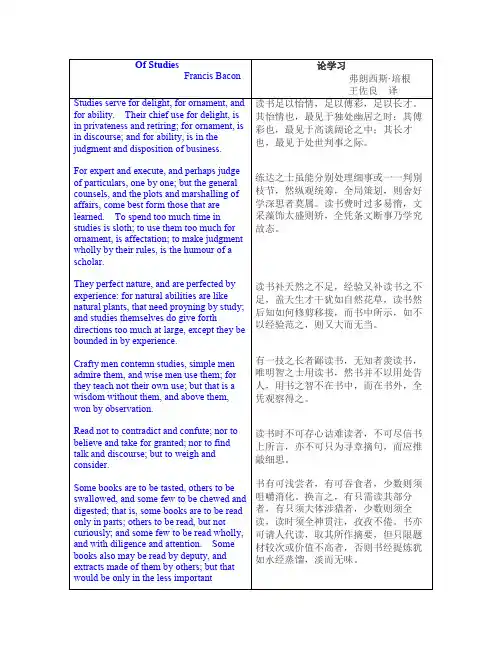
Of Studies by Francios Bacon Studies serve for delight, for ornament, and for ability. Their chief use for delight, is in privateness and retiring; for ornament, is in discourse; and for ability, is in the judgment, and disposition of business. For expert men can execute, and perhaps judge of particulars, one by one; but the general counsels, and the plots and marshalling of affairs, come best, from those that are learned. To spend too much time in studies is sloth; to use them too much for ornament, is affectation; to make judgment wholly by their rules, is the humor of a scholar. They perfect nature, and are perfected by experience: for natural abilities are like natural plants, that need pruning, by study; and studies themselves, do give forth directions too much at large, except they be bounded in by experience. Crafty men contemn studies, simple men admire them, and wise men use them; for they teach not their own use; but that is a wisdom without them, and above them,won by observation. Read not to contradict and confute; nor to believe and take for granted; nor to find talk and discourse; but to weigh and consider. Some books are to be tasted, others to be swallowed, and some few to be chewed and digested; that is, some books are to be read only in parts; others to be read, but not curiously; and some few to be read wholly, and with diligence and attention. Some books also may be read by deputy, and extracts made of them by others; but that would be only in the less important arguments, and the meaner sort of books, else distilled books are like common distilled waters, flashy things.Reading maketh a full man; conference a ready man; and writing an exact man. And therefore, if a man write little, he had need have a great memory; if he confer little, he had need have a present wit; and if he read little, he had need have much cunning, to seem to know, that he does not. Histories make men wise; poets witty; the mathematics subtle; natural philosophy deep; moral grave; logic and rhetoric able to contend. Abeunt studia in mores. Nay, there is no stand or impediment in the wit, but may be wrought out by fit studies; like as diseases of the body, may have appropriate exercises. Bowling is good for the stone and reins; shooting for the lungs and breast; gentle walking for the stomach; riding for the head; and the like. So if a man's wit be wandering, let him study the mathematics; for in demonstrations, if his wit be called away never so little, he must begin again. If his wit be not apt to distinguish or find differences, let him study the Schoolmen; for they are cymini sectors. If he be not apt to beat over matters, and to call up one thing to prove and illustrate another, let him study the lawyers' cases. So every defect of the mind, may have a special receipt.谈读书(王佐良译)读书足以怡情,足以傅彩,足以长才。
中英对照培根《论学习》of_study王佐良先生翻译OF STUDYSTUDIES serve for delight, for ornament, and for ability. Theirchief use for delight, is in privateness and retiring; for ornament, is in discourse; and for ability, is in the judgment, and disposition of business. For expert men can exe-cute, and perhaps judge of particulars, one by one; but the general counsels, and the plots and marshalling of affairs, come best, from those that are learned. To spend too much time in studies is sloth; to use them too much for ornament, is affectation; to make judgment wholly by their rules, is the humor of a scholar. They perfect nature, and are perfected by experience: for natural abilities are like natural plants, that need proyning, by study; and studies themselves, do give forth directions too much at large, except they be bounded in by experience. Crafty mencontemn studies, simple men admire them, and wise men use them; for they teach not their own use; but that is a wisdom without them, and above them, won by observation. Read not to contradict and confute; nor to believe and take for granted; nor to find talk and discourse; but to weigh and consider. Some books are to be tasted, others to be swallowed, and some few to be chewed and digested; that is, some books are to be read only in parts; others to be read, but not curiously; and some few to be read wholly, and with diligence andattention. Some books also may be read by deputy, and extracts madeof them bothers; but that would be only in the less important arguments, and the meaner sort of books, else distilled books are like common distilled waters, flashy things.Reading makes a full man; conference a ready man; and writing anexact man. And therefore, if a man write little, he had need have agreat memory; if he confer little, he had need have a present wit: andif he read little, he had need have much cunning, to seem to know, that he doth not. Histories make menwise; poets witty; the mathematics subtitle; natural philosophy deep; moral grave; logic and rhetoric able to contend. Abeunt studia in mores. Nay, there is no stand or impediment in the wit, but may be wrought out by fit studies; like as diseases of the body, may have appropriate exercises. Bowling is good for the stone and reins; shooting for the lungs and breast; gentle walking for the stomach; riding for the head; and the like. So if a man's wit be wandering, let him study the mathematics; for in demonstrations, if his wit be called away never so little, he must begin again. If his wit be not apt to distinguish orfind differences, let him study the Schoolmen; for they are cymini sectors. If he be not apt to beat over matters, and to call up one thing to prove and illustrate another, let him study the lawyers' cases. So every defect of the mind, may have a special receipt读书足以怡情,足以博彩,足以长才。
关于培根的爱情语录1、爱情原来就是如此的,对方如果不以同样的爱情作报酬,那么就是暗地里在轻蔑你。
——弗·培根《随笔集》2、就是神,在爱情中也难保持聪明。
——弗兰西斯·培根《培根论人生》3、爱情就像银行里存一笔钱,能欣赏对方的优点,就像补充收入;容忍对方缺点,这是节制支出。
所谓永恒的爱,是从红颜爱到白发,从花开爱到花残。
——培根4、一切真正伟大的人物(无论是古人、今人,只要是其英名永铭于人类记忆中的),没有一个因爱情而发狂的人:因为伟大的事业抑制了这种软弱的感情。
——培根5、用物质来供奉的爱情,当你停止给予的时候,它就很快消灭了。
——弗·培根《随笔集》6、爱情,在舞台上要比在人生中更有欣赏价值。
过度的爱情,必然会夸张对象的*质和价值。
爱情的代价就是如此,不能得到回爱,就会得到一种深藏于心的轻蔑,这是一条永真的定律。
人们应当十分*惕这感情,因为它不但会使人类丧失其他,而且可以使人丧失自己本身。
——培根《论爱情》7、爱情和智慧,二者不可兼得——培根8、了解爱情的人往往会因为爱情的升华而坚定他们向上的意志和进取精神。
——培根9、人不能绝灭爱情,亦不可迷恋爱情。
——培根10、爱情不仅会占领开旷坦阔的胸怀,有时也能闯入壁垒森严的心灵。
——培根11、痒……也是一种快感——培根12、男人看似无所不能,实际上却被身后伟大的爱情所支配统驭。
——培根13、虽然爱情的奴隶并不同于那只顾吃喝的禽兽,但毕竟也是眼目*相的奴隶。
——弗兰西斯·培根《论爱情》14、爱情无孔不入;它不仅能钻进敞开着的心扉,而且还能钻进戒备森严却偶有疏忽的方寸。
——弗·培根《随笔集》15、如果说,友谊能够调剂人的感情的话,那么友谊的又一种作用则是能增进人的智慧。
——弗兰西斯·培根《培根论人生》16、因结婚而产生的爱,造出儿女;因友情而产生的爱,造就一个人。
——培根17、研究真理(就是向它求爱求婚),认识真理(就是与之同处),和相信真理(就是享受它),乃是人*中最高的美德。
培根论友谊引言友谊是人类社会中不可或缺的一部分。
自古以来,人们对友谊的意义和特性进行了广泛的探讨。
而英国哲学家培根(Francis Bacon)也对友谊进行了深入的分析和论述。
本文将围绕任务名称”培根论友谊”展开论述,从不同角度探讨友谊的含义、作用以及培养友谊的方法。
友谊的含义友谊是一种建立在信任、互助和共享的基础上的人际关系。
它是人类对彼此的真诚情感的体现,不仅仅局限于物质利益的交换。
友谊可以带给人们情感上的支持和安慰,使人们在困难时不感孤单。
友谊也是一种相互尊重和理解的精神纽带,促使人们关注他人的需求和感受。
友谊的作用友谊在人类社会中扮演着重要的角色,以下是友谊的几个作用:1. 情感支持真正的友谊能够给人们带来情感上的支持和安慰。
当人们遇到困难和挫折时,友谊可以成为他们的精神支柱,给予他们勇气和希望。
好友之间的真诚关怀和心灵沟通,使人们感到安心和被理解。
2. 互助合作友谊鼓励人们相互帮助和合作。
朋友之间的信任和互相支持,使人们在困难时能够携手共进,共同面对挑战。
友谊能够激发人们的团队合作精神,促进共同成长。
3. 知识分享友谊也是一种知识的分享和学习的机会。
朋友之间可以互相交流经验和见解,从而拓宽自己的视野。
通过友谊,人们可以学习到不同领域的知识和技能,促进个人的成长与进步。
4. 心灵慰藉友谊有助于减少孤独感和心理压力。
当人们遭遇挫折或失去亲人时,朋友的陪伴和支持可以填补空虚和伤痛带来的心理空间。
友谊给予人们精神上的慰藉和安慰,使人们重拾生活的信心和勇气。
培养友谊的方法友谊需要经营和培养,以下是几个培养友谊的方法:1. 真诚与信任真诚和信任是友谊的基石。
要培养友谊,首先要对朋友真诚相待,不虚伪不做作。
同时,要建立起彼此之间的信任关系,不背叛、不背后捅刀子。
只有真诚和信任的友谊才能长久。
2. 互相理解与尊重友谊建立在互相理解和尊重的基础上。
我们应该努力去理解对方的需求和感受,尊重对方的意见和决定。
爱情在舞台上要比在生活中更为美好。
在舞台上,爱情只是作为喜剧或悲剧的素材,而在真实的生活中,爱情却常常伴随着不幸。
有时候,爱情像是魅力无穷的魔女,有时却又像令人望而生畏的复仇女神。
一切真正的伟人(那些英名长存的古人今人),我们可以发现,没有一个因爱情而发狂犯癫,伟大的事业抑制住了这种软弱的感情……古罗马的埃比克拉斯曾经说过一句不那么明智的话:“人生不过是一座大戏台。
”本应全力追求高尚辉煌的人,似乎只能玩偶般地逢场作戏。
尽管做爱情的奴隶与只管埋头酒肉的禽兽不可同日而语,但毕竟也只是追求眼目感官之乐的奴隶,而上帝赐人以双目本是让人有更崇高的目的。
在爱情上过度沉湎追求,必然使人的自身价值降低。
显而易见的是,在爱情的氛围中,无休止地充满了浮华逢迎之语。
而这些词语用之于任何其他场合,则只能令人耻笑惊异。
古人云:“人总是把夸张的奉承留给他自己”——只有对情人的奉承要算例外。
因为即使是最傲慢的人,也甘于在情人面前俯首帖耳。
“在爱情面前,即使神也难免糊涂”。
古人这句话可谓一语中的。
情人的这种弱点不仅为外人所明察,即使在被追求者的眼中,也会一目了然——除非她(他)也同时陷入了爱的漩涡。
这是一种爱的代价,若不能得到爱的回应,对方心底就会生出难言的轻蔑。
这是一条至真的定律。
因此,人们应当对这种感情抱以充分的警惕,因为爱情不但会使人产生迷惘,而且可以让人失去尊严与人格。
至于其他方面的代价,古代诗人荷马早就告诉我们,美女海伦的那位追求者,全部放弃了他的财富与智慧。
人最软弱之时是爱情最易入侵之日——即春风得意和孤独窘困之时——人最易于为爱情之火点燃。
当然,爱情未必会降临给那些一筹莫展的人。
由此可见,“爱情”不过是“愚蠢”之子。
但却有一些人,即使心存爱意,也能加以约束,使之不致妨碍更为重大的事业。
否则,情绪一受爱情之扰,便会阻滞人向远大目标迈进。
比较而言,许多军人更易坠入爱河,不知何故。
或许这像军人们嗜爱饮酒一般,险象环生的生活更需欢乐来填充。
《培根论人生》之论爱情爱情在舞台上,要比在人生中更有欣赏价值。
因为在舞台上爱情既是喜剧也是悲剧的素材,而在人生中,爱情常常招致不幸。
它有时像那位诱惑人的魔女①,有时又像那位复仇的女神②。
你可以看到,一切真正伟大的人物(无论是古人、今人,只要是其英名永铭于人类记忆中的),没有一个因爱情而发狂的人。
这说明伟大的精神和伟大的事业可以摒除过度的激情。
然而罗马的安东尼和克劳底亚是例外③。
前者本性就好色荒淫,然而后者却是一个严肃明哲的人。
这说明爱情不仅会占领没有城府的胸怀,有时也能闯入壁垒森严的心灵——假如守御不严的话。
埃辟克拉斯④曾说过一句笨话:“人生不过是一座大舞台。
”似乎一个本该秉承天意、追求高尚目标的人,却应一事不做而只拜在一个小小的偶像面前,成为自己感官的奴隶——虽然还不是口腹之欲的奴隶(那简直与禽兽无异了),即娱目色相的奴隶。
而上帝赐人以眼睛本来是有更高尚的用途的。
过度的爱情,必然会夸张对象的性质和价值。
例如,只有在爱情中,才总是需要那种浮夸诌媚的词令。
而在其他场合,同样的词令只能招人耻笑。
古人有一句名言:“最大的奉承,人总是留给自己。
”——只有对情人的奉承要算例外。
因为甚至最骄傲的人,也甘愿在情人面前自轻自贱。
所以古人说得好:“人在爱情中不会聪明。
”情人的这种弱点不仅在外人眼中是明显的,就是在被爱者的眼中也会很明显——除非她(他)也在爱他(她)。
所以,爱情的代价就是如此,不能得到回爱,就会得到一种深藏于心的轻蔑,这是一条永真的定律。
由此中可见,人们应当十分警惕这感情。
因它它不但会使人丧失其他,而且可以使人丧失自已本身。
至于其他方面的损失,古诗人荷马早告诉我们,那追求海伦的巴立斯王子竟拒绝了天后朱诺(财富女神)和密纳发(智慧女神)的礼物。
这就是说,溺身于情的人,是甘愿放弃财富和智慧的⑤。
当人心最软弱的时候,爱情最容易入侵,那就是当人春风得意、忘乎所以和处境窘困孤独凄零的时候,虽然在后一情境中不易得到爱情。
培根:论爱情(Bacon:Of Love) The stage is more beholding to love, than the life of man. For as to the stage,love is ever matter of comedies, and now and then of tragedies; but in life itdoth much mischief; sometimes like a siren, sometimes like a fury.
舞台上的爱情生活比生活中的爱情要美好得多。因为在舞台上,爱情只是喜剧和悲剧的素材,而在人生中,爱情却常常招来不幸。它有时象那位诱惑人的魔女(1),有时又象那位复仇的女神(2)。
You may observe, that amongst allthe great and worthy persons (whereof the memory remaineth, either ancient orrecent) there is not one, that hath been transported to the mad degree of love:which shows that great spirits, and great business, do keep out this weakpassion. You must except, nevertheless, Marcus Antonius, the half partner ofthe empire of Rome, and Appius Claudius, the decemvir and lawgiver; whereof theformer was indeed a voluptuous man, and inordinate; but the latter was anaustere and wise man: and therefore it seems (though rarely) that love can findentrance, not only into an open heart, but also into a heart well fortified, ifwatch be not well kept.
你可以看到,一切真正伟大的人物(无论是古人、今人,只要是其英名永铭于人类记忆中的),没有一个是因爱情而发狂的人。因为伟大的事业只有罗马的安东尼和克劳底亚是例外(3)。前者本性就好色荒淫,然而后者却是严肃多谋的人。这说明爱情不仅会占领开旷坦阔的胸怀,有时也能闯入壁垒森严的心灵 ----假如手御不严的话。
It is a poor saying of Epicurus,Satis magnum alter alteri theatrum sumus; as if man, made for the contemplationof heaven, and all noble objects, should do nothing but kneel before a littleidol, and make himself a subject, though not of the mouth (as beasts are), yetof the eye; which was given him for higher purposes.
埃辟克拉斯(4)曾说过一句笨话:“人生不过是一座大戏台。”似乎本应努力追求高尚事业的人类,却只应象玩偶般地逢场作戏。虽然爱情的奴隶并不同于那班只顾吃喝的禽兽,但毕竟也只是眼目色相的奴隶,而上帝赐人以眼睛本来是有更高尚的用途的。
It is a strange thing, to notethe excess of this passion, and how it braves the nature, and value of things,by this; that the speaking in a perpetual hyperbole, is comely in nothing butin love. Neither is it merely in the phrase; for whereas it hath been wellsaid, that the arch-flatterer, with whom all the petty flatterers haveintelligence, is a man's self; certainly the lover is more. For there was neverproud man thought so absurdly well of himself, as the lover doth of the personloved; and therefore it was well said, That it is impossible to love, and to bewise. Neither doth this weakness appear to others only, and not to the partyloved; but to the loved most of all, except the love be reciproque. For it is atrue rule, that love is ever rewarded, either with the reciproque, or with aninward and secret contempt.
过度的爱情追求,必然会降低人本身的价值。例如,只有在爱情中,才总是需要那种浮夸陷媚的词令。而在其他场合,同样的词令只能招人耻笑。古人有一句名言:“最大的奉承,人总是留给自己的。”----只有对情人的奉承要算例外。因为甚至最骄傲的人,也甘愿在情人面前自轻自贱。所以古人说得好:“就 是神在爱情中也难保持聪明。”情人的这种弱点不仅在外人眼中是明显的,就是在被追求者的眼中也会很明显----除非她(他)也在追求他(她)。所以,爱情 的代价就是如此,不能得到回爱,就会得到一种深藏于心的轻蔑,这是一条永真的定律。
By how much the more, men oughtto beware of this passion, which loseth not only other things, but itself! Asfor the other losses, the poet's relation doth well figure them: that he thatpreferred Helena,quitted the gifts of Juno and Pallas. For whosoever esteemeth too much ofamorous affection, quitteth both riches and wisdom.
由此可见,人们应当十分警惕这种感情。因为它不但会使人丧失其他,而且可以使人丧失自己本身。甚至其他方面的损失,古诗人早告诉我们,那追求海伦的人,是放弃了财富和智慧的(5)。
This passion hath his floods, invery times of weakness; which are great prosperity, and great adversity; though this latter hath been less observed: both which times kindle love, and make itmore fervent, and therefore show it to be the child of folly. They do best, whoif they cannot but admit love, yet make it keep quarters; and sever it wholly from their serious affairs, and actions, of life; for if it check once with business,it troubleth men's fortunes, and maketh men, that they can no ways be true to their own ends.
由此可见,人们应当十分警惕这种感情。因为它不但会使人丧失其他,而且可以使人丧失自己本身。甚至其他方面的损失,古诗人早告诉我们,那追求海伦的人,是放弃了财富和智慧的(5)。
I know not how, but martial men are given to love: I think, it is but as they are given to wine; for perils commonly ask to be paid in pleasures. 我不懂是什么缘故,使许多军人更容易堕入情网,也许这正象他们嗜爱饮酒一样,是因为危险的生活更需要欢乐的补偿。
There is in man's nature, a secretinclination and motion, towards love of others, which if it be not spent upon someone or a few, doth naturally spread itself towards many, and maketh men becomehumane and charitable; as it is seen sometime in friars.
人心中可能普遍具有一种博爱倾向,若不集中于某个专一的对象身上,就必然施之于更广泛的大众,使他成为仁善的人,像有的僧侣那样。
Nuptial love maketh mankind; friendly love perfecteth it; but wanton love corrupteth, and embaseth it.
夫妻的爱,使人类繁衍。朋友的爱,给人以帮助。但那荒淫纵欲的爱,却只会使人堕落毁灭啊!
附注: (1) 古希腊神话,传说地中海有魔女,歌喉动听,诱使过往船只陷入险境。 (2) 原文为“Flries”,传说中的地狱之神。 (3) 安东尼,恺撒部将。后因迷恋女色而战败被杀。克劳底亚,古罗马执政官,亦因好色而被杀。 (4) 埃辟克拉斯(前342--前270年),古罗马哲学家。 (5) 古希腊神话,传说天后赫拉,智慧之神密纳发和美神维纳斯,为争夺金苹果,请特洛伊王子评判。三神各许一愿, 密纳发许以智慧,维纳斯许以美女海伦,天后许以财富。结果王子把金苹果给了维纳斯。